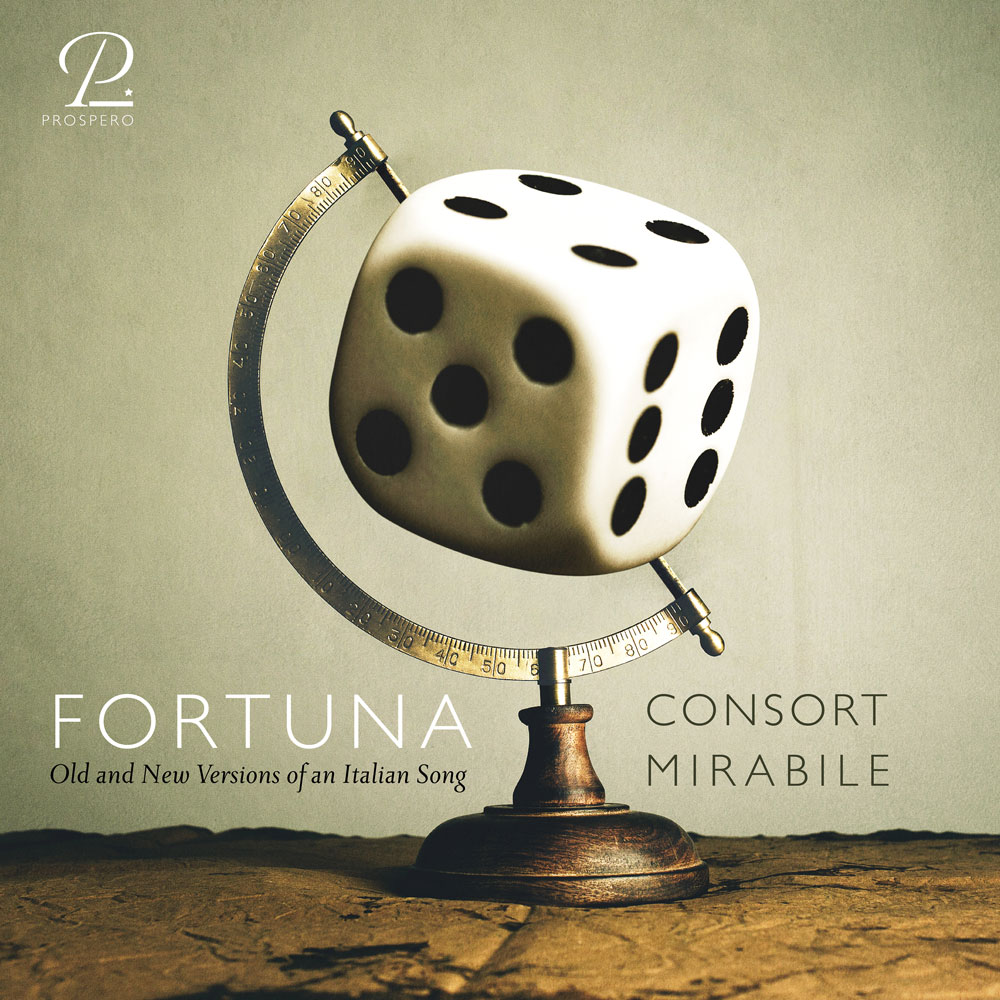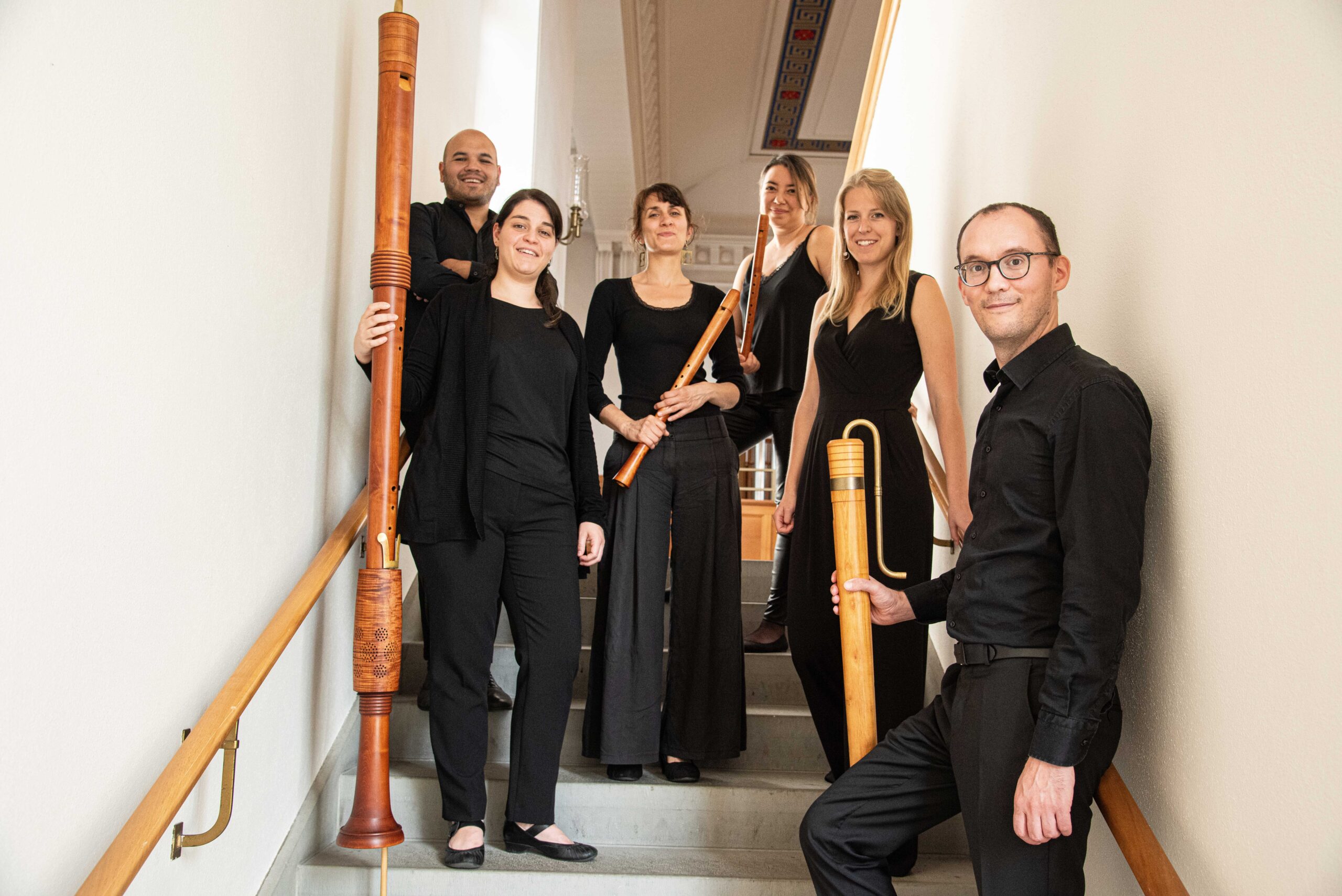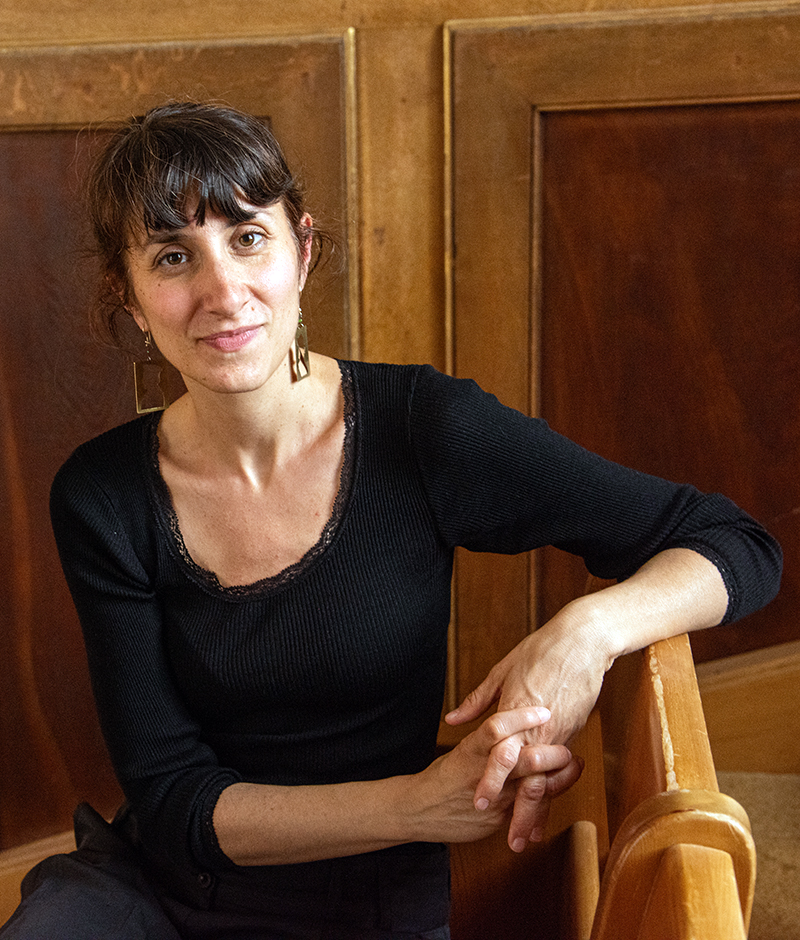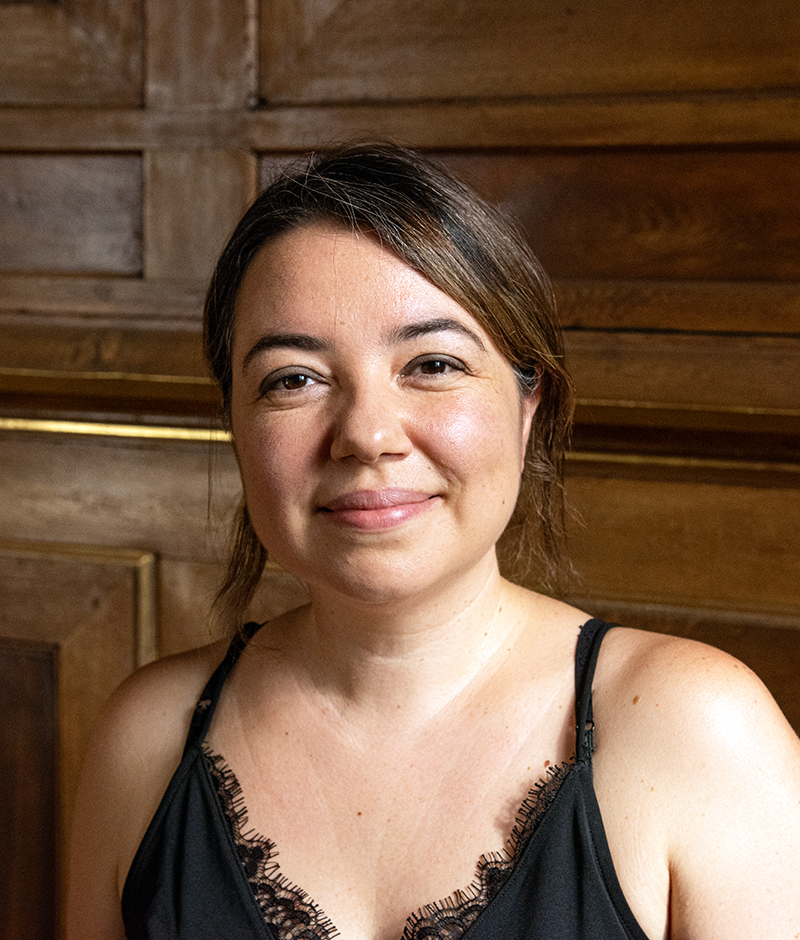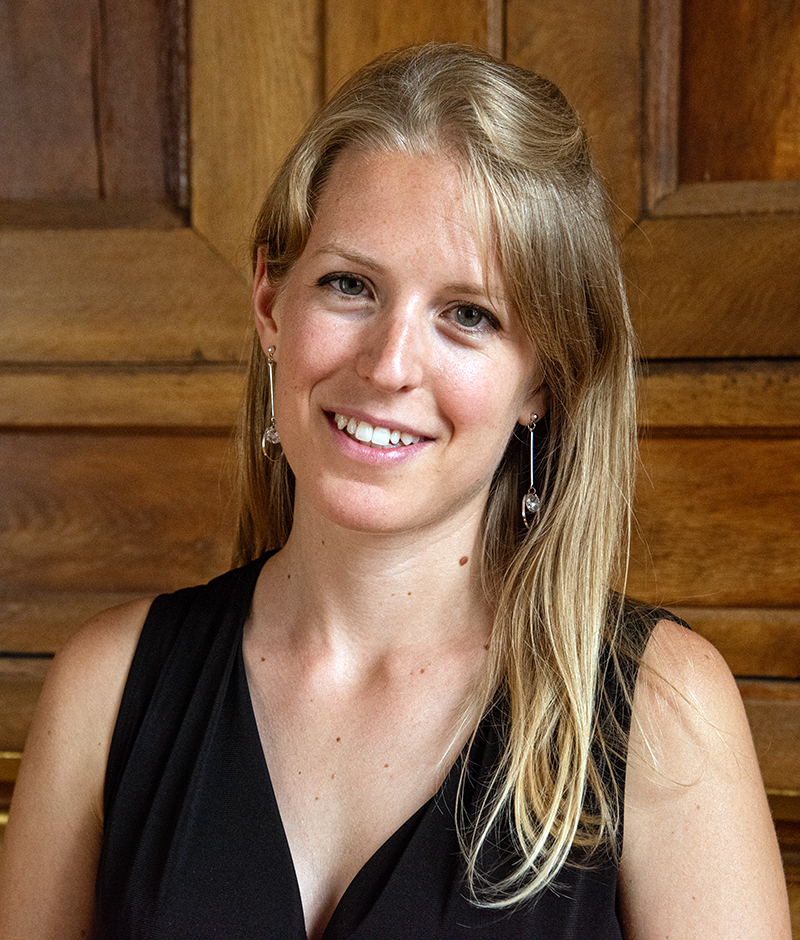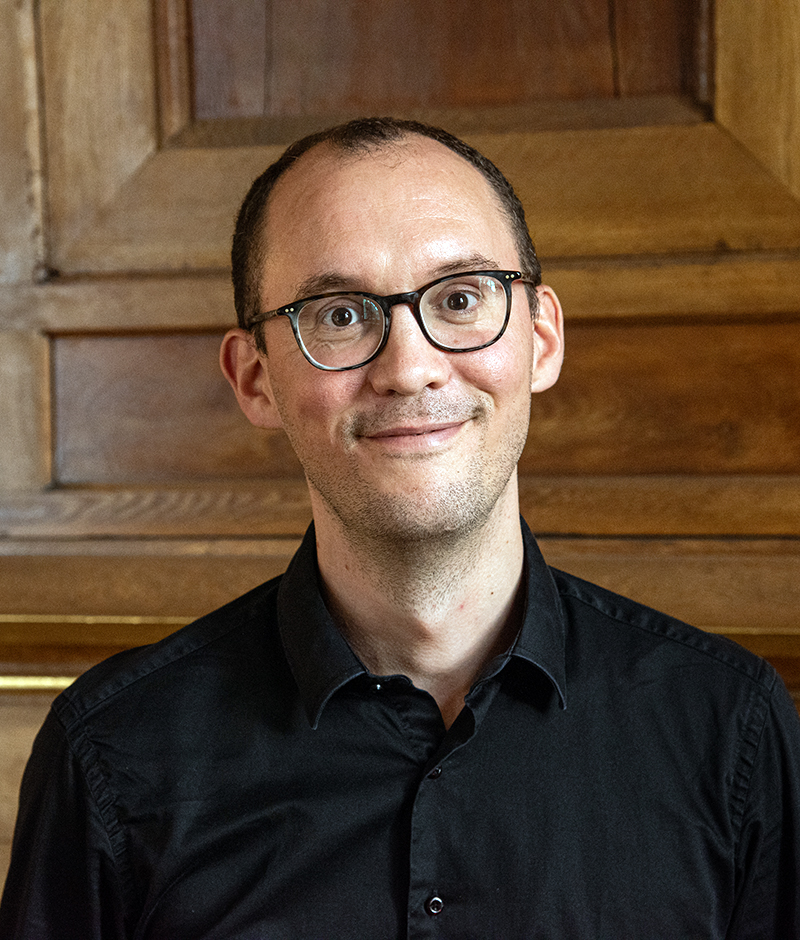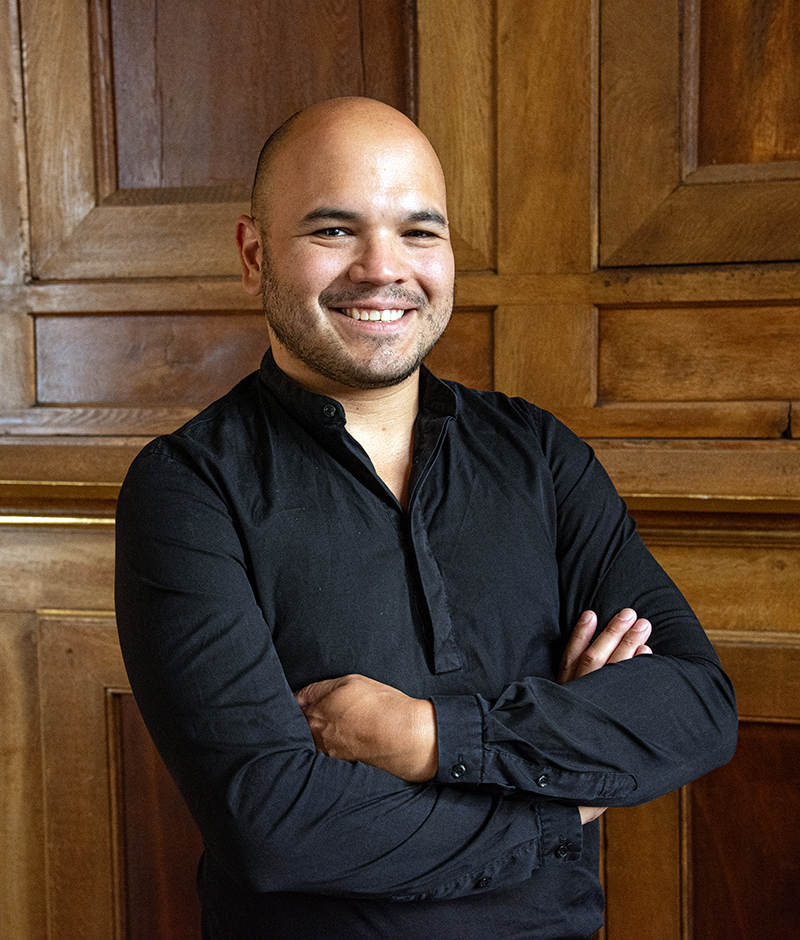About us
mirabile [mi’ràbile]:
what is cause of marvel, amazement, attributable to wondrous and unusual events
Consort Mirabile is a vocal and instrumental ensemble, specializing in Renaissance music while still maintaining a lively collaboration with contemporary composers. The founding members came together from different countries, drawn by a love for recorder consort playing. The inclusion of voices, sustained and enveloped by the recorders, is a distinguishing trait of the ensemble.
In 2016 Consort Mirabile was selected as one of the promising emerging ensembles by the International Young Artists’ Presentation (IYAP, Belgium). It regularly performs throughout Europe. Consort Mirabile aims to bring the music of the Renaissance and its historical performance practice to a wide audience. It has also set itself the task of promoting new compositions for consort recorders and voice, transporting the colour and sound palette of Renaissance instruments into the contemporary music scene, and thus allowing listeners to enjoy the juxtaposition of musics from centuries far apart.
In 2024 Consort Mirabile’s first cd “Fortuna” is released by Prospero Classical in coproduction with the Swiss radio DRS 2 Kultur.
Compositions commissioned by Consort Mirabile for the “Fortuna” project:
- Ivana Kiš “Fortuna disperata” (2019)
- Kilian Deissler “Fortuna disperata” (2021)
- Bardia Charaf “Fortuna disperata” (2023)
Consort Mirabile has been supported by Migros Kulturprozent, Ernst Göhner Stiftung, Binding Stiftung, Kanton Zürich, Gemeinde Thalwil.

Alice Boccafogli
Alice fell in love with the recorder at the age of 8. She studied in Italy with Giorgio Pacchioni and Daniele Salvatore, then in the Netherlands with Daniël Brüggen where she obtained a Bachelor’s degree in Early Music and a Master’s degree in Music Pedagogy at the Koninklijk Conservatorium in The Hague.
Alice has studied classical singing with Michele Andalò and Vitali Rozynko, and baroque singing with soprano Sonia Tedla Chebreab.
She furthered her musical studies with Lorenzo Cavasanti, Peter van Heygen, Sebastian Marq, Antonio Politano, John Tyson, Reine-Marie Verhagen and Dorothea Winter (recorder), Alessandro Quarta, Lia Serafini, Gemma Bertagnolli, Cinzia Forte and Emma Kirkby (singing).
Alice has performed with numerous ensembles, working with conductors such as Frans Brüggen, Kaspars Putniņš, Alessandro Quarta, Henry MacMillan, Hernan Schvartzman, Jan Kees Braaksma.

She has released two recordings with the Coro da camera di Bologna, a third, with Armonia delle Sfere, with music of Antonia Bembo.
She is member of Consort Mirabile, of which she was founding member in 2015, of Breeze, a recorder trio specializing in Renaissance repertoire and story-telling, and a trio with baroque violinist Cecilia Baesso and continuo player Santo Militello, specializing in Italian Seicento vocal and instrumental repertoire.
Alice is very passionate about recorder consort teaching: after studying for many years with specialist Daniël Brüggen (Amsterdam Loeki Stardust Kwartet) she dedicated her Master’s studies to researching the didactic aspects of the subject and is now a dedicated teacher.
Alice Boccafogli
Alice fell in love with the recorder at the age of 8. She studied in Italy with Giorgio Pacchioni and Daniele Salvatore, then in the Netherlands with Daniël Brüggen where she obtained a Bachelor’s degree in Early Music and a Master’s degree in Music Pedagogy at the Koninklijk Conservatorium in The Hague.
Alice has studied classical singing with Michele Andalò and Vitali Rozynko, and baroque singing with soprano Sonia Tedla Chebreab.
She furthered her musical studies with Lorenzo Cavasanti, Peter van Heygen, Sebastian Marq, Antonio Politano, John Tyson, Reine-Marie Verhagen and Dorothea Winter (recorder), Alessandro Quarta, Lia Serafini, Gemma Bertagnolli, Cinzia Forte and Emma Kirkby (singing).
Alice has performed with numerous ensembles, working with conductors such as Frans Brüggen, Kaspars Putniņš, Alessandro Quarta, Henry MacMillan, Hernan Schvartzman, Jan Kees Braaksma.
She has released two recordings with the Coro da camera di Bologna, a third, with Armonia delle Sfere, with music of Antonia Bembo.
She is member of Consort Mirabile, of which she was founding member in 2015, of Breeze, a recorder trio specializing in Renaissance repertoire and story-telling, and a trio with baroque violinist Cecilia Baesso and continuo player Santo Militello, specializing in Italian Seicento vocal and instrumental repertoire.
Alice is very passionate about recorder consort teaching: after studying for many years with specialist Daniël Brüggen (Amsterdam Loeki Stardust Kwartet) she dedicated her Master’s studies to researching the didactic aspects of the subject and is now a dedicated teacher.
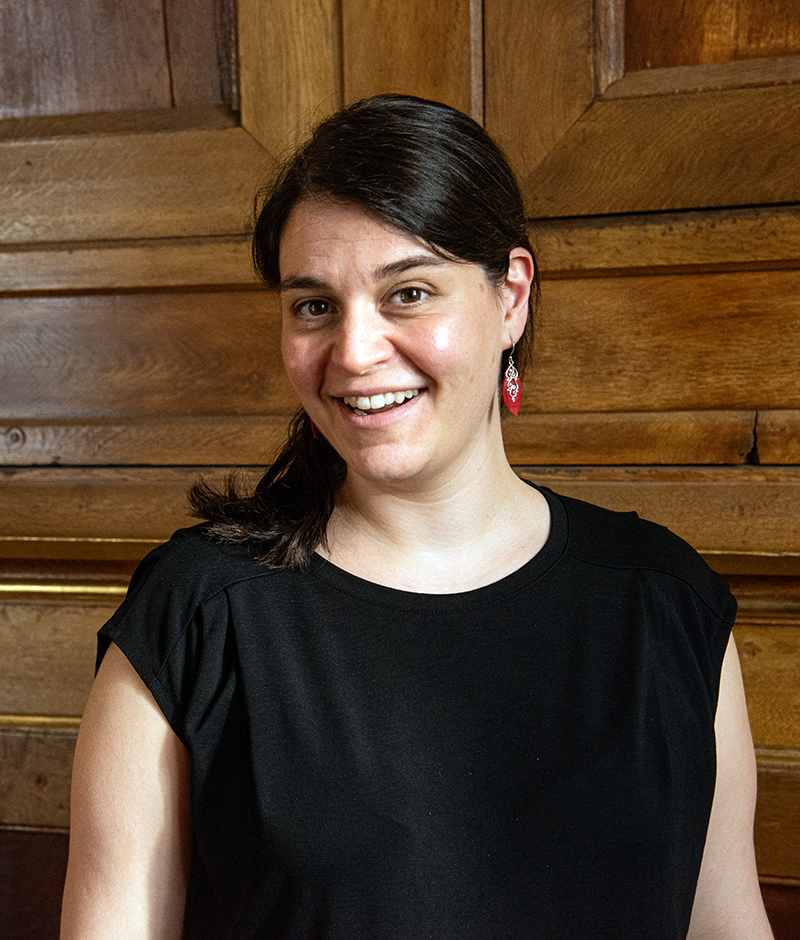

Isabella Mercuri
Isabella Mercuri began her recorder studies at the Zürcher Hochschule der Künste (CH) in the class of Kees Boeke and completed her Master’s degree in Early Music at the Koninklijk Conservatorium in Den Haag (NL) in the class of Daniel Brüggen. At the same time, she followed baroque oboe lessons with Frank de Bruine and persued her studies in baroque and classical oboe with Paolo Grazzi at the Conservatorio E. F. Dall’Abaco in Verona (IT).
Isabella Mercuri regularly performs as recorder player and baroque oboist with various chamber music ensembles and orchestras throughout Europe. She participated in the Schütz-Zyklus (2017-2022) under the direction of Ludwig Wicki in Lucerne (CH), played as a guest with the 21st Century Orchestra at the KKL and was invited to perform in other renowned concert halls such as Concertgebouw Brugge, Tivoli Vredenburg Utrecht and Badisches Staatstheater Karlsruhe.
In 2022 she played the first oboe in the first performance on period instruments of the St. Matthew Passion (J.S. Bach) in Serbia under the direction of Predrag Gosta. For this project Isabella Mercuri was supported by the Istituto Italiano di Cultura Belgrado.
In 2020 she obtained a Master’s degree in music pedagogy at the Zürcher Hochschule der Künste in the class of Andreas Böhlen and teaches children, teenagers and adults individually as well as in various chamber music groups in Swiss music schools.

Isabella Mercuri
Isabella Mercuri began her recorder studies at the Zürcher Hochschule der Künste (CH) in the class of Kees Boeke and completed her Master’s degree in Early Music at the Koninklijk Conservatorium in Den Haag (NL) in the class of Daniel Brüggen. At the same time, she followed baroque oboe lessons with Frank de Bruine and persued her studies in baroque and classical oboe with Paolo Grazzi at the Conservatorio E. F. Dall’Abaco in Verona (IT).
Isabella Mercuri regularly performs as recorder player and baroque oboist with various chamber music ensembles and orchestras throughout Europe. She participated in the Schütz-Zyklus (2017-2022) under the direction of Ludwig Wicki in Lucerne (CH), played as a guest with the 21st Century Orchestra at the KKL and was invited to perform in other renowned concert halls such as Concertgebouw Brugge, Tivoli Vredenburg Utrecht and Badisches Staatstheater Karlsruhe.
In 2022 she played the first oboe in the first performance on period instruments of the St. Matthew Passion (J.S. Bach) in Serbia under the direction of Predrag Gosta. For this project Isabella Mercuri was supported by the Istituto Italiano di Cultura Belgrado.
In 2020 she obtained a Master’s degree in music pedagogy at the Zürcher Hochschule der Künste in the class of Andreas Böhlen and teaches children, teenagers and adults individually as well as in various chamber music groups in Swiss music schools.

Soledad Brondino
Soledad Brondino holds a Master of Music in Historical Bassoons (Dulcian, Baroque and Classical) from the Conservatorium of Amsterdam in the class of Benny Aghassi, with a minor in modern Bassoon with Ronald Karten. Her Master’s thesis concerns the Repertoire for Bajón in Cuzco (Peru) in the 17th century.
She also obtained a Master universitaire Recherche et Pratique Orchestrale (Université de Poitiers, Abbaye aux Dames Saintes), with Javier Zafra, among others.
She gained her Bachelor of Music in Recorder at Koninklijk Conservatorium in The Hague in the class of Sébastien Marq, and she has studied with Pedro Memelsdorff at the program for continous education of the Escola Superior de Música de Catalunya.
In Argentina, she obtained her Licenciatura at the Instituto Universitario Nacional del Arte.

Soledad has participated in projects conducted by Alfredo Bernardini, Amandine Beyer, Kristian Bezuidenhout, Daniël Brüggen, Julien Chauvin, Christophe Coin, Marcus Creed, Stéphanie Marie Degand, Paul Dombrecht, Josep Domenech, Gabriel Garrido, Philippe Herreweghe, Sigiswald Kuijken, Andreas Küppers, Johannes Leertouwer, Sébastien Marq, Kenneth Montgomery, Hervé Niquet, Raphaël Pichon, Shunske Sato, Evgenii Sviridov, Menno van Delft, Peter van Heyghen, Jos van Veldhoven, Teunis van der Zwart, Léo Warynski, among others.
She has performed with various ensembles at Festival Oude Muziek Utrecht (Fringe), MA Festival Brugge (Fringe), AlbaNova Festival, Bloomington Early Music Festival, Festival de Saintes, among others.
Soledad has participated in CD recordings such as Joseph Haydn’s Die Jahreszeiten with Orpheus Vokalensemble and Concerto Köln conducted by Marcus Creed, Guerre et Paix music by Jean-Philippe Rameau conducted by Bruno Procopio.
Soledad works as a freelancer musician and as a teacher at Stichting Het Leerorkest and Artiance – Centrum voor de Kunsten.
Soledad Brondino
Soledad Brondino holds a Master of Music in Historical Bassoons (Dulcian, Baroque and Classical) from the Conservatorium of Amsterdam in the class of Benny Aghassi, with a minor in modern Bassoon with Ronald Karten. Her Master’s thesis concerns the Repertoire for Bajón in Cuzco (Peru) in the 17th century.
She also obtained a Master universitaire Recherche et Pratique Orchestrale (Université de Poitiers, Abbaye aux Dames Saintes), with Javier Zafra, among others.
She gained her Bachelor of Music in Recorder at Koninklijk Conservatorium in The Hague in the class of Sébastien Marq, and she has studied with Pedro Memelsdorff at the program for continous education of the Escola Superior de Música de Catalunya.
In Argentina, she obtained her Licenciatura at the Instituto Universitario Nacional del Arte.
Soledad has participated in projects conducted by Alfredo Bernardini, Amandine Beyer, Kristian Bezuidenhout, Daniël Brüggen, Julien Chauvin, Christophe Coin, Marcus Creed, Stéphanie Marie Degand, Paul Dombrecht, Josep Domenech, Gabriel Garrido, Philippe Herreweghe, Sigiswald Kuijken, Andreas Küppers, Johannes Leertouwer, Sébastien Marq, Kenneth Montgomery, Hervé Niquet, Raphaël Pichon, Shunske Sato, Evgenii Sviridov, Menno van Delft, Peter van Heyghen, Jos van Veldhoven, Teunis van der Zwart, Léo Warynski, among others.
She has performed with various ensembles at Festival Oude Muziek Utrecht (Fringe), MA Festival Brugge (Fringe), AlbaNova Festival, Bloomington Early Music Festival, Festival de Saintes, among others.
Soledad has participated in CD recordings such as Joseph Haydn’s Die Jahreszeiten with Orpheus Vokalensemble and Concerto Köln conducted by Marcus Creed, Guerre et Paix music by Jean-Philippe Rameau conducted by Bruno Procopio.
Soledad works as a freelancer musician and as a teacher at Stichting Het Leerorkest and Artiance – Centrum voor de Kunsten.

Marta Redaelli
Parallel to her masters in Psychology (Università di Trento) and in Human Resource (Tilburg University, NL), she graduated in Baroque and Renaissance Singing at Conservatorio Bonporti (Trento, Italy) under the guidance of Lia Serafini. She later furthered her musical studies with Ulrike Sonntag, Thomas Seyboldt, Sonia Tedla Chebreab, Roberto Balconi, Rinaldo Alessandrini, Alessandro Quarta, Sara Mingardo and Monica Bacelli.
She has worked with numerous conductors and ensembles, such as Giulio Prandi, Fabio Bonizzoni, Alfredo Bernardini, Markus Poschner, Lorenzo Ghielmi, Vittorio Ghielmi, Roberto Zarpellon, Marian Polin, Giuseppe Maletto, Maxim Emelyanychev. She has performed as soloist in some of the most prestigious halls and festivals in Europe, such as Het Concertgebouw (Amsterdam), Oude Muziek (Utrecht), Festival d’Ambronay, Festival de la Chaise Dieu, Internationale Händel-Festspiele Göttingen, Kartause Mauerbach (Wien),
Teatro Filarmonico di Verona, Pavia Barocca,Teatro Comunale di Ferrara, Scuola Grande di San Rocco (Venice), Festival Pergolesi-Spontini (Jesi), Teatro Olimpico (Vicenza), Trento MusicAntica, Brixner Initiative Musik und Kirche, Settimane Musicali Meranesi, Monteverdi Festival (Cremona), Wratislavia Cantans (Breslavia), De Bijloke (Gand).
Marta Redaelli
Parallel to her masters in Psychology (Università di Trento) and in Human Resource (Tilburg University, NL), she graduated in Baroque and Renaissance Singing at Conservatorio Bonporti (Trento, Italy) under the guidance of Lia Serafini. She later furthered her musical studies with Ulrike Sonntag, Thomas Seyboldt, Sonia Tedla Chebreab, Roberto Balconi, Rinaldo Alessandrini, Alessandro Quarta, Sara Mingardo and Monica Bacelli.
She has worked with numerous conductors and ensembles, such as Giulio Prandi, Fabio Bonizzoni, Alfredo Bernardini, Markus Poschner, Lorenzo Ghielmi, Vittorio Ghielmi, Roberto Zarpellon, Marian Polin, Giuseppe Maletto, Maxim Emelyanychev. She has performed as soloist in some of the most prestigious halls and festivals in Europe, such as Het Concertgebouw (Amsterdam), Oude Muziek (Utrecht), Festival d’Ambronay, Festival de la Chaise Dieu, Internationale Händel-Festspiele Göttingen, Kartause Mauerbach (Wien),
Teatro Filarmonico di Verona, Pavia Barocca,Teatro Comunale di Ferrara, Scuola Grande di San Rocco (Venice), Festival Pergolesi-Spontini (Jesi), Teatro Olimpico (Vicenza), Trento MusicAntica, Brixner Initiative Musik und Kirche, Settimane Musicali Meranesi, Monteverdi Festival (Cremona), Wratislavia Cantans (Breslavia), De Bijloke (Gand).

Thibault Viviani
Thibault Viviani studied recorder in Villeurbanne (FR) with Frédérique Thouvenot, in The Hague (NL) with Dorothea Winter and Sébastien Marq and in Zurich (CH) with Kees Boeke. He also studied traverso in Zurich with Maria Goldschmidt-Pahn and in Trossingen (DE) with Linde Brunmayr-Tutz.
He has performed with various orchestras and ensembles, such as the Orchestra La Scintilla an der Oper Zürich, the Berner Consort, the Ensemble Desmarest (Paris) and the Royal Improviser Orchestra (Amsterdam).
As a member of the PRIME recorder ensemble under the direction of Antonio Politano, he participated in the creation of numerous compositions for recorders and live electronics and recorded a CD for the label O-live Music/ETK.
He can be heard on the CD Das Lautenbuch der von Erlach with the Ensemble Accords Nouveaux under the direction of Andreas Schlegel. He performs regularly with the Bach.Lab.Group, an ensemble that brings together musicians from the fields of jazz and early music.

In the field of music theatre, he is active in the Compagnie des Zeph’ where he is involved in the creation and performance of the children’s play Pipo/L’Heure Bleue. He is also active in the music theatre projects of the Tiefenrausch cycle in Zurich, whose performances combine medieval art, literature and music.
Thibault Viviani
Thibault Viviani studied recorder in Villeurbanne (FR) with Frédérique Thouvenot, in The Hague (NL) with Dorothea Winter and Sébastien Marq and in Zurich (CH) with Kees Boeke. He also studied traverso in Zurich with Maria Goldschmidt-Pahn and in Trossingen (DE) with Linde Brunmayr-Tutz.
He has performed with various orchestras and ensembles, such as the Orchestra La Scintilla an der Oper Zürich, the Berner Consort, the Ensemble Desmarest (Paris) and the Royal Improviser Orchestra (Amsterdam).
As a member of the PRIME recorder ensemble under the direction of Antonio Politano, he participated in the creation of numerous compositions for recorders and live electronics and recorded a CD for the label O-live Music/ETK.
He can be heard on the CD Das Lautenbuch der von Erlach with the Ensemble Accords Nouveaux under the direction of Andreas Schlegel. He performs regularly with the Bach.Lab.Group, an ensemble that brings together musicians from the fields of jazz and early music.
In the field of music theatre, he is active in the Compagnie des Zeph’ where he is involved in the creation and performance of the children’s play Pipo/L’Heure Bleue. He is also active in the music theatre projects of the Tiefenrausch cycle in Zurich, whose performances combine medieval art, literature and music.

Andrés Montilla-Acurero
Born in Venezuela, Andrés started his musical training at Niños Cantores del Zulia with Juan Carlos Bersague. He studied singing with Alessandro Quarta, earning a degree in Baroque Singing with Gemma Bertagnolli and Teresa Chirico (Conservatorio L. Refice), pursuing studies in Chant semiology with Alberto Turco and Vocal Chamber Music with Anthony Rooley and Evelyn Tubb (Schola Cantorum Basiliensis). Besides music, Andrés also earned a Ph.D. Political Philosophy under the direction of philosopher Paul Gilbert.
Andrés sings regularly with conductors such as Rinaldo Alessandrini, Jörg-Andreas Bötticher, Francesco Cera, Fabio Lombardo, Marco Mencoboni, Alessandro Quarta, Jordi Savall, Stefan Steinemann, Walter Testolin and Michele Vannelli and alongside with La Capella Reial de Catalunya, Concerto Italiano, Micrologus, Concerto Romano, Ensemble Arte Musica, Cantar Lontano, L’Homme armé, Dramatodia, De Labyrintho, La Venexiana, RossoPorpora and Voces Suaves.
His repertoire is mainly focused on the high tenor/alto roles of the Italian ‘600, on the French haute-contre roles between 17th and 18th century, and on 18th century tenor roles, specially on the role of the Evangelist in Bach.
He has recently performed the role of Persée in Lully’s Persée at the Amuz in Antwerp and Musikhuset Aalborg Opera Festival; the role of Zoroastre in Rameau’s Zoroastre conducted by C. Astronio at Rimini’s Sagra Musicale Malatestiana in a film production directed by Gianni di Capua; the role of San Giovanni Battista in Stradella’s San Giovanni Battista at the Teatro Argentina in Rome conducted by A. Quarta & Concerto Romano; the role of Arnalta in Monteverdi’s L’Incoronazione di Poppea in Bologna conducted by M. Vannelli and staged by A. Allegrezza; the role of Pastore (alto) in Monteverdi’s L’Orfeo conducted by R. Alessandrini & Concerto Italiano in Barcelona, Adelaide and Beijing; the role of Eumete in Monteverdi’s Il Ritorno d’Ulisse in Patria conducted by A. Quarta in Rome at Teatro di Villa Torlonia and at Teatro Flavio Vespasiano di Rieti; the role of Un Athlète in Rameau’s Castor et Pollux in Heidelberg; the role of Nutrice in Monteverdi’s L’Incoronazione di Poppea under A. Quarta at Theater Kiel; and the role of Licco in Antonia Bembo’s Ercole amante under Jörg Halubek in Stuttgart and Herne.
Andrés Montilla-Acurero
Born in Venezuela, Andrés started his musical training at Niños Cantores del Zulia with Juan Carlos Bersague. He studied singing with Alessandro Quarta, earning a degree in Baroque Singing with Gemma Bertagnolli and Teresa Chirico (Conservatorio L. Refice), pursuing studies in Chant semiology with Alberto Turco and Vocal Chamber Music with Anthony Rooley and Evelyn Tubb (Schola Cantorum Basiliensis). Besides music, Andrés also earned a Ph.D. Political Philosophy under the direction of philosopher Paul Gilbert.
Andrés sings regularly with conductors such as Rinaldo Alessandrini, Jörg-Andreas Bötticher, Francesco Cera, Fabio Lombardo, Marco Mencoboni, Alessandro Quarta, Jordi Savall, Stefan Steinemann, Walter Testolin and Michele Vannelli and alongside with La Capella Reial de Catalunya, Concerto Italiano, Micrologus, Concerto Romano, Ensemble Arte Musica, Cantar Lontano, L’Homme armé, Dramatodia, De Labyrintho, La Venexiana, RossoPorpora and Voces Suaves.
His repertoire is mainly focused on the high tenor/alto roles of the Italian ‘600, on the French haute-contre roles between 17th and 18th century, and on 18th century tenor roles, specially on the role of the Evangelist in Bach.
He has recently performed the role of Persée in Lully’s Persée at the Amuz in Antwerp and Musikhuset Aalborg Opera Festival; the role of Zoroastre in Rameau’s Zoroastre conducted by C. Astronio at Rimini’s Sagra Musicale Malatestiana in a film production directed by Gianni di Capua; the role of San Giovanni Battista in Stradella’s San Giovanni Battista at the Teatro Argentina in Rome conducted by A. Quarta & Concerto Romano; the role of Arnalta in Monteverdi’s L’Incoronazione di Poppea in Bologna conducted by M. Vannelli and staged by A. Allegrezza; the role of Pastore (alto) in Monteverdi’s L’Orfeo conducted by R. Alessandrini & Concerto Italiano in Barcelona, Adelaide and Beijing; the role of Eumete in Monteverdi’s Il Ritorno d’Ulisse in Patria conducted by A. Quarta in Rome at Teatro di Villa Torlonia and at Teatro Flavio Vespasiano di Rieti; the role of Un Athlète in Rameau’s Castor et Pollux in Heidelberg; the role of Nutrice in Monteverdi’s L’Incoronazione di Poppea under A. Quarta at Theater Kiel; and the role of Licco in Antonia Bembo’s Ercole amante under Jörg Halubek in Stuttgart and Herne.

